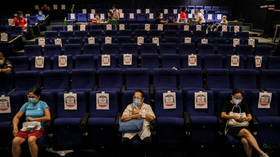$42,000-a-year HIV vaccine trialed in Africa
US biopharmaceutical company Gilead Sciences Inc. has claimed that an experimental vaccine has demonstrated 100% efficacy for the prevention of HIV infections in women, after conducting trials in South Africa and Uganda
Trials with the twice-yearly ‘lenacapavir’ shot involved about 5,300 women aged between 16 and 25, the company announced last week. Some were injected with lenacapavir while others received the company’s older Truvada medication, which is taken orally once a day.
“First Phase 3 HIV Prevention Trial Ever to Show Zero Infections,” the company said in a press release published on its website. “The results demonstrated the superiority of twice-yearly lenacapavir [over Truvada]” and exceeded the company’s expectations, it added.
“With zero infections and 100% efficacy, twice-yearly lenacapavir has demonstrated its potential as an important new tool to help prevent HIV infections,” said Merdad Parsey, chief medical officer of Gilead Sciences. “We look forward to additional results from the ongoing PURPOSE clinical program and continuing toward our goal of helping to end the HIV epidemic for everyone, everywhere,” he added.
The US Food and Drug Administration (FDA) approved lenacapavir, which is sold under the brand name Sunlenca, for the treatment of HIV infections in adults in 2022. The expected cost of the medication is reportedly $42,250 in the first year and $39,000 annually after that.
Critics have long argued that the biggest barrier to supplying the medication to Africa will be the cost.
Melb Simiyu, an HIV prevention officer in Uganda, previously said that for PrEP (Pre-exposure prophylaxis) drugs to be accessible in the world’s poorest countries, the cost should not exceed $100 annually. “If it’s a lot more than that, we’re sunk,” she told the media.
Activist groups have called on Gilead to facilitate access to lenacapavir. The company replied that it is still searching for partners “able to supply high-quality, low-cost versions of lenacapavir.”
According to global statistics, there are currently around 39 million people worldwide infected with HIV, of whom 1.5 million are children. Africa is disproportionately affected with 25.6 million cases.
You can share this story on social media:








Comments are closed.